The Role of Community in Mental Health Recovery and Support
VerifiedAdded on 2023/06/08
|7
|1510
|452
Essay
AI Summary
This essay provides an overview of mental health within a community context, emphasizing the importance of community support, recovery processes, psychiatric rehabilitation, human rights, and challenging discrimination. It highlights the role of communities in promoting mental well-being and providing essential care services, including mental health centers staffed by counselors, psychologists, and social workers. The essay also discusses the stages of mental health recovery, the challenges faced by individuals with mental health issues, and the significance of legislation like Australia's mental health statements of rights and responsibilities and the Disability Discrimination Act in protecting the rights of those with mental disabilities. Psychiatric rehabilitation is presented as a crucial treatment approach for helping individuals regain functional skills and achieve life goals, ultimately underscoring the interconnectedness of individual well-being and community support in mental health.
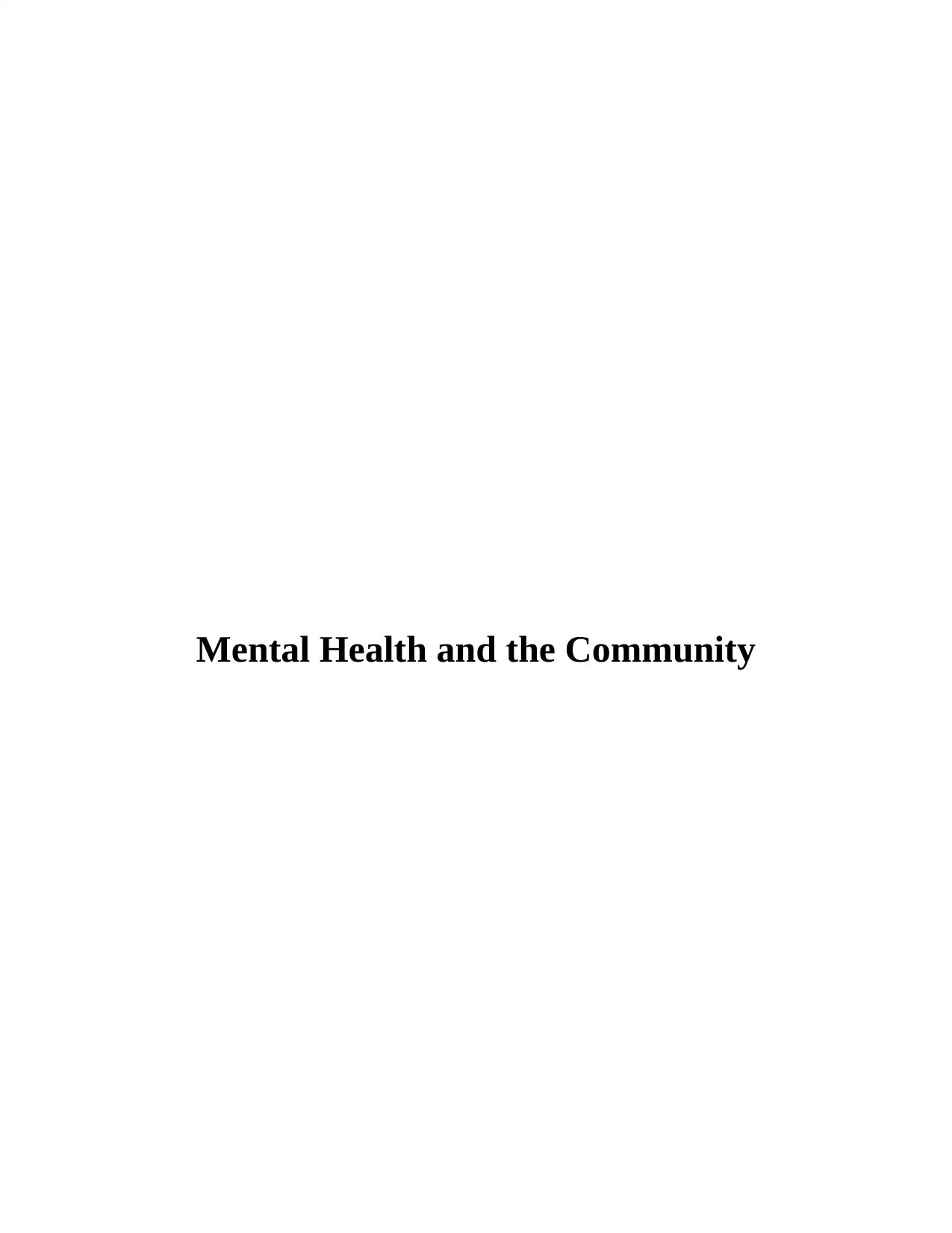
Mental Health and the Community
Paraphrase This Document
Need a fresh take? Get an instant paraphrase of this document with our AI Paraphraser
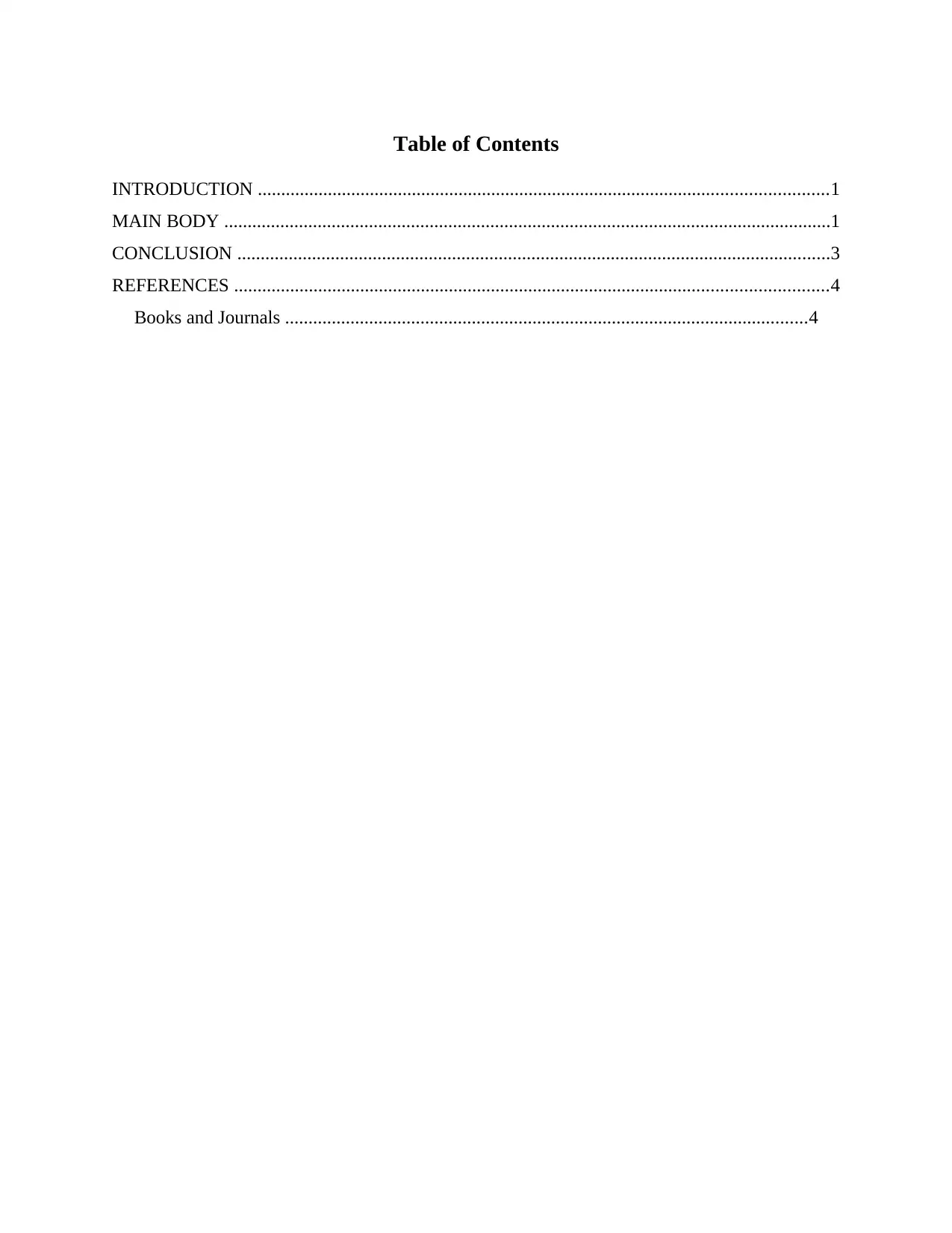
Table of Contents
INTRODUCTION ..........................................................................................................................1
MAIN BODY ..................................................................................................................................1
CONCLUSION ...............................................................................................................................3
REFERENCES ...............................................................................................................................4
Books and Journals ................................................................................................................4
INTRODUCTION ..........................................................................................................................1
MAIN BODY ..................................................................................................................................1
CONCLUSION ...............................................................................................................................3
REFERENCES ...............................................................................................................................4
Books and Journals ................................................................................................................4
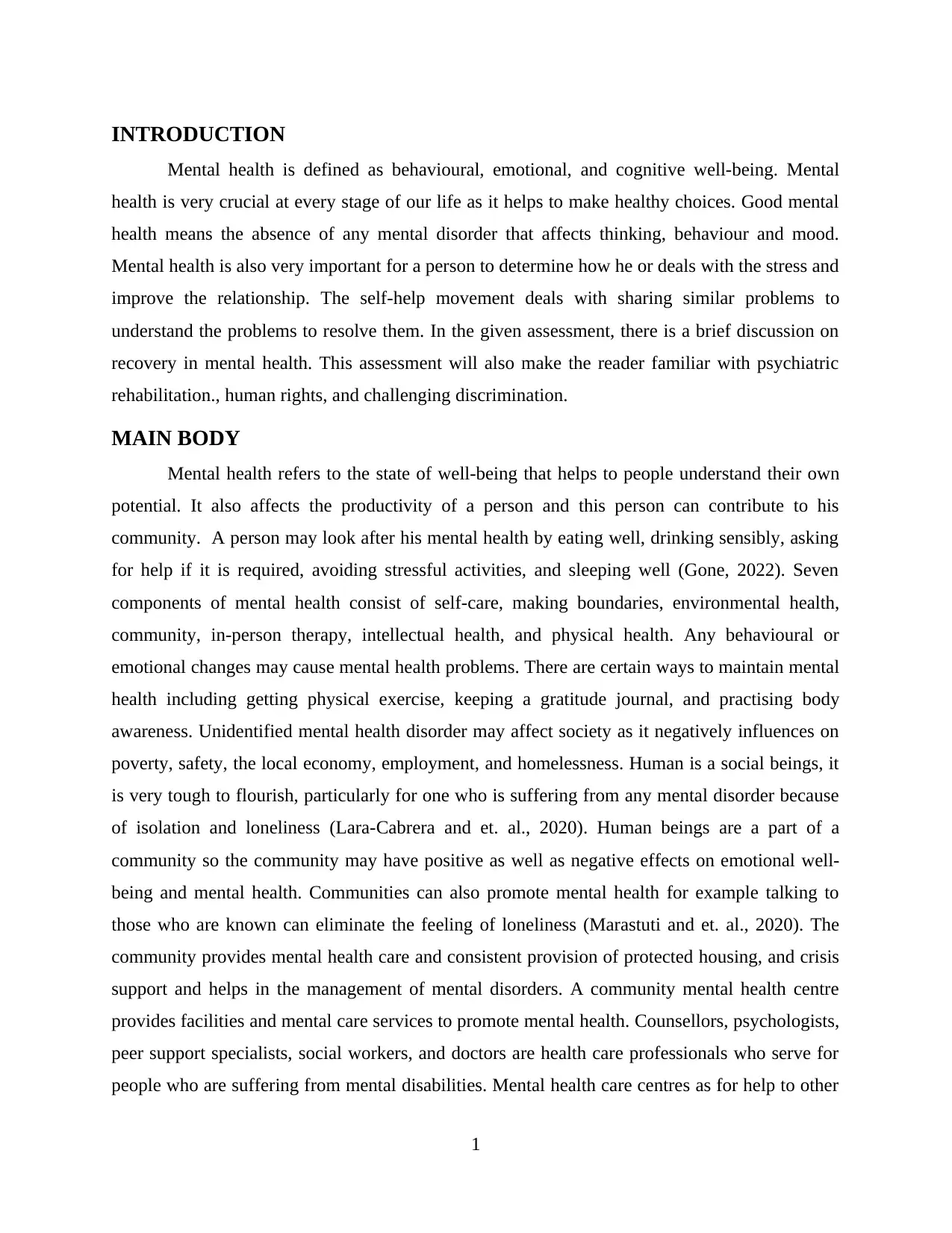
INTRODUCTION
Mental health is defined as behavioural, emotional, and cognitive well-being. Mental
health is very crucial at every stage of our life as it helps to make healthy choices. Good mental
health means the absence of any mental disorder that affects thinking, behaviour and mood.
Mental health is also very important for a person to determine how he or deals with the stress and
improve the relationship. The self-help movement deals with sharing similar problems to
understand the problems to resolve them. In the given assessment, there is a brief discussion on
recovery in mental health. This assessment will also make the reader familiar with psychiatric
rehabilitation., human rights, and challenging discrimination.
MAIN BODY
Mental health refers to the state of well-being that helps to people understand their own
potential. It also affects the productivity of a person and this person can contribute to his
community. A person may look after his mental health by eating well, drinking sensibly, asking
for help if it is required, avoiding stressful activities, and sleeping well (Gone, 2022). Seven
components of mental health consist of self-care, making boundaries, environmental health,
community, in-person therapy, intellectual health, and physical health. Any behavioural or
emotional changes may cause mental health problems. There are certain ways to maintain mental
health including getting physical exercise, keeping a gratitude journal, and practising body
awareness. Unidentified mental health disorder may affect society as it negatively influences on
poverty, safety, the local economy, employment, and homelessness. Human is a social beings, it
is very tough to flourish, particularly for one who is suffering from any mental disorder because
of isolation and loneliness (Lara-Cabrera and et. al., 2020). Human beings are a part of a
community so the community may have positive as well as negative effects on emotional well-
being and mental health. Communities can also promote mental health for example talking to
those who are known can eliminate the feeling of loneliness (Marastuti and et. al., 2020). The
community provides mental health care and consistent provision of protected housing, and crisis
support and helps in the management of mental disorders. A community mental health centre
provides facilities and mental care services to promote mental health. Counsellors, psychologists,
peer support specialists, social workers, and doctors are health care professionals who serve for
people who are suffering from mental disabilities. Mental health care centres as for help to other
1
Mental health is defined as behavioural, emotional, and cognitive well-being. Mental
health is very crucial at every stage of our life as it helps to make healthy choices. Good mental
health means the absence of any mental disorder that affects thinking, behaviour and mood.
Mental health is also very important for a person to determine how he or deals with the stress and
improve the relationship. The self-help movement deals with sharing similar problems to
understand the problems to resolve them. In the given assessment, there is a brief discussion on
recovery in mental health. This assessment will also make the reader familiar with psychiatric
rehabilitation., human rights, and challenging discrimination.
MAIN BODY
Mental health refers to the state of well-being that helps to people understand their own
potential. It also affects the productivity of a person and this person can contribute to his
community. A person may look after his mental health by eating well, drinking sensibly, asking
for help if it is required, avoiding stressful activities, and sleeping well (Gone, 2022). Seven
components of mental health consist of self-care, making boundaries, environmental health,
community, in-person therapy, intellectual health, and physical health. Any behavioural or
emotional changes may cause mental health problems. There are certain ways to maintain mental
health including getting physical exercise, keeping a gratitude journal, and practising body
awareness. Unidentified mental health disorder may affect society as it negatively influences on
poverty, safety, the local economy, employment, and homelessness. Human is a social beings, it
is very tough to flourish, particularly for one who is suffering from any mental disorder because
of isolation and loneliness (Lara-Cabrera and et. al., 2020). Human beings are a part of a
community so the community may have positive as well as negative effects on emotional well-
being and mental health. Communities can also promote mental health for example talking to
those who are known can eliminate the feeling of loneliness (Marastuti and et. al., 2020). The
community provides mental health care and consistent provision of protected housing, and crisis
support and helps in the management of mental disorders. A community mental health centre
provides facilities and mental care services to promote mental health. Counsellors, psychologists,
peer support specialists, social workers, and doctors are health care professionals who serve for
people who are suffering from mental disabilities. Mental health care centres as for help to other
1
⊘ This is a preview!⊘
Do you want full access?
Subscribe today to unlock all pages.

Trusted by 1+ million students worldwide
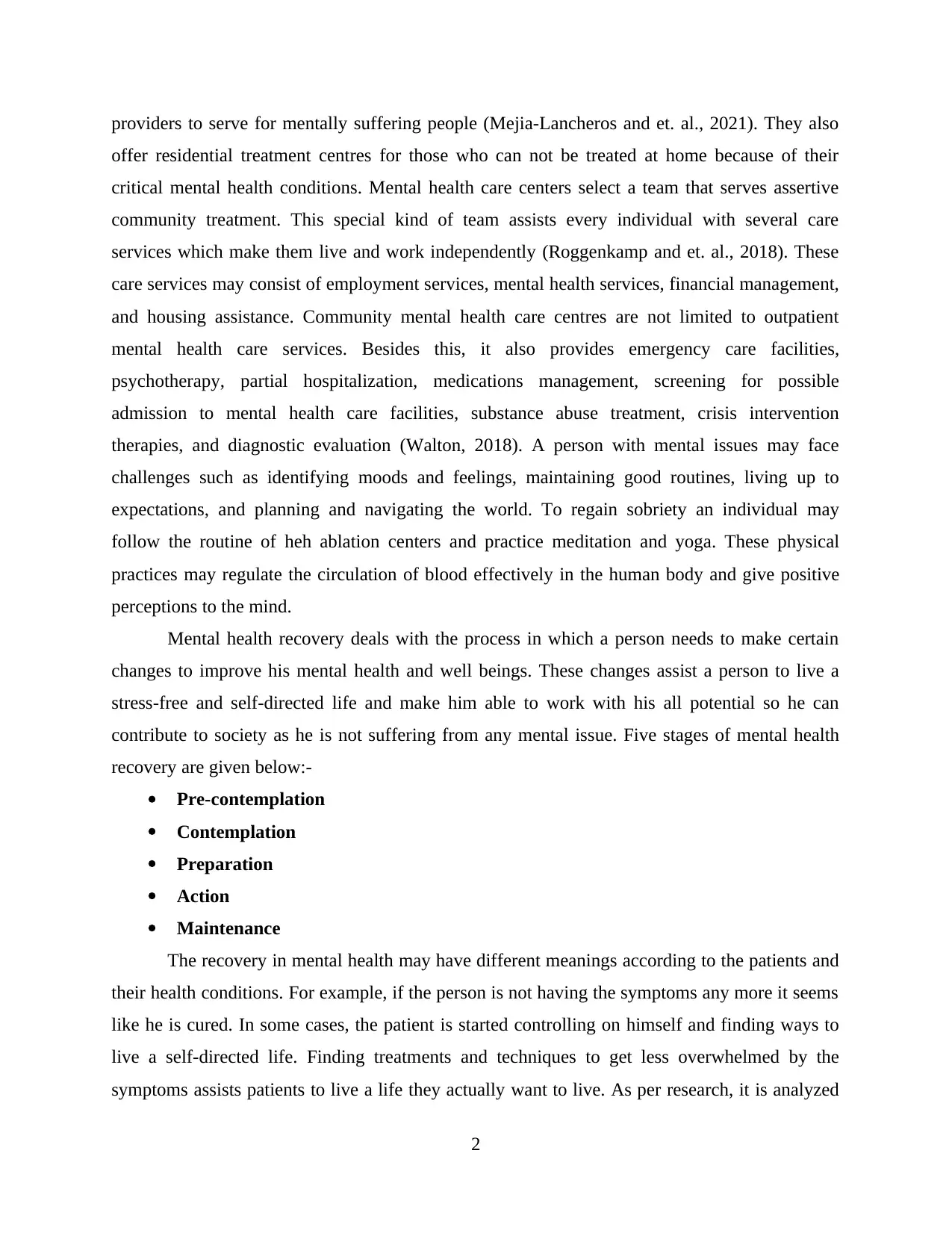
providers to serve for mentally suffering people (Mejia-Lancheros and et. al., 2021). They also
offer residential treatment centres for those who can not be treated at home because of their
critical mental health conditions. Mental health care centers select a team that serves assertive
community treatment. This special kind of team assists every individual with several care
services which make them live and work independently (Roggenkamp and et. al., 2018). These
care services may consist of employment services, mental health services, financial management,
and housing assistance. Community mental health care centres are not limited to outpatient
mental health care services. Besides this, it also provides emergency care facilities,
psychotherapy, partial hospitalization, medications management, screening for possible
admission to mental health care facilities, substance abuse treatment, crisis intervention
therapies, and diagnostic evaluation (Walton, 2018). A person with mental issues may face
challenges such as identifying moods and feelings, maintaining good routines, living up to
expectations, and planning and navigating the world. To regain sobriety an individual may
follow the routine of heh ablation centers and practice meditation and yoga. These physical
practices may regulate the circulation of blood effectively in the human body and give positive
perceptions to the mind.
Mental health recovery deals with the process in which a person needs to make certain
changes to improve his mental health and well beings. These changes assist a person to live a
stress-free and self-directed life and make him able to work with his all potential so he can
contribute to society as he is not suffering from any mental issue. Five stages of mental health
recovery are given below:-
Pre-contemplation
Contemplation
Preparation
Action
Maintenance
The recovery in mental health may have different meanings according to the patients and
their health conditions. For example, if the person is not having the symptoms any more it seems
like he is cured. In some cases, the patient is started controlling on himself and finding ways to
live a self-directed life. Finding treatments and techniques to get less overwhelmed by the
symptoms assists patients to live a life they actually want to live. As per research, it is analyzed
2
offer residential treatment centres for those who can not be treated at home because of their
critical mental health conditions. Mental health care centers select a team that serves assertive
community treatment. This special kind of team assists every individual with several care
services which make them live and work independently (Roggenkamp and et. al., 2018). These
care services may consist of employment services, mental health services, financial management,
and housing assistance. Community mental health care centres are not limited to outpatient
mental health care services. Besides this, it also provides emergency care facilities,
psychotherapy, partial hospitalization, medications management, screening for possible
admission to mental health care facilities, substance abuse treatment, crisis intervention
therapies, and diagnostic evaluation (Walton, 2018). A person with mental issues may face
challenges such as identifying moods and feelings, maintaining good routines, living up to
expectations, and planning and navigating the world. To regain sobriety an individual may
follow the routine of heh ablation centers and practice meditation and yoga. These physical
practices may regulate the circulation of blood effectively in the human body and give positive
perceptions to the mind.
Mental health recovery deals with the process in which a person needs to make certain
changes to improve his mental health and well beings. These changes assist a person to live a
stress-free and self-directed life and make him able to work with his all potential so he can
contribute to society as he is not suffering from any mental issue. Five stages of mental health
recovery are given below:-
Pre-contemplation
Contemplation
Preparation
Action
Maintenance
The recovery in mental health may have different meanings according to the patients and
their health conditions. For example, if the person is not having the symptoms any more it seems
like he is cured. In some cases, the patient is started controlling on himself and finding ways to
live a self-directed life. Finding treatments and techniques to get less overwhelmed by the
symptoms assists patients to live a life they actually want to live. As per research, it is analyzed
2
Paraphrase This Document
Need a fresh take? Get an instant paraphrase of this document with our AI Paraphraser
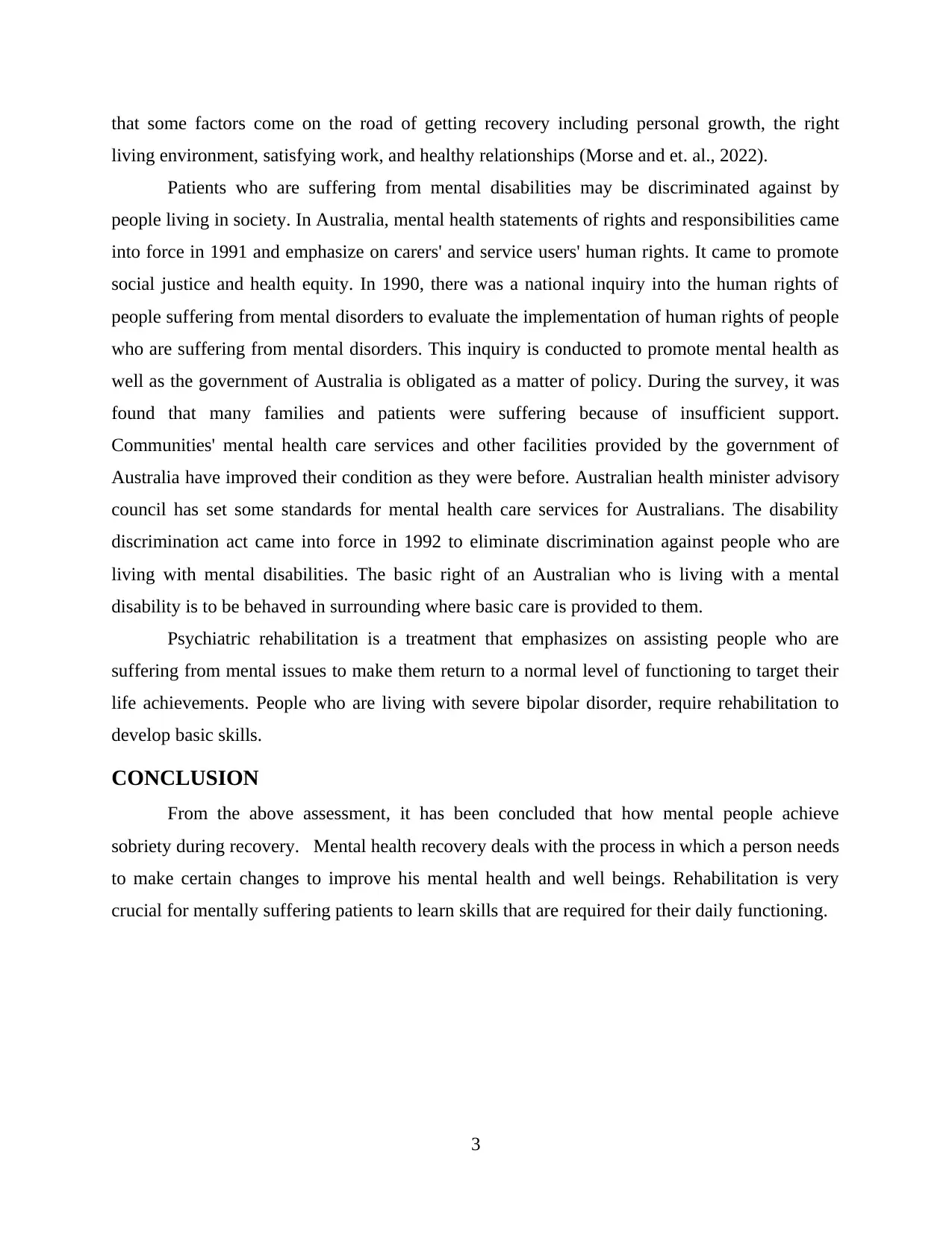
that some factors come on the road of getting recovery including personal growth, the right
living environment, satisfying work, and healthy relationships (Morse and et. al., 2022).
Patients who are suffering from mental disabilities may be discriminated against by
people living in society. In Australia, mental health statements of rights and responsibilities came
into force in 1991 and emphasize on carers' and service users' human rights. It came to promote
social justice and health equity. In 1990, there was a national inquiry into the human rights of
people suffering from mental disorders to evaluate the implementation of human rights of people
who are suffering from mental disorders. This inquiry is conducted to promote mental health as
well as the government of Australia is obligated as a matter of policy. During the survey, it was
found that many families and patients were suffering because of insufficient support.
Communities' mental health care services and other facilities provided by the government of
Australia have improved their condition as they were before. Australian health minister advisory
council has set some standards for mental health care services for Australians. The disability
discrimination act came into force in 1992 to eliminate discrimination against people who are
living with mental disabilities. The basic right of an Australian who is living with a mental
disability is to be behaved in surrounding where basic care is provided to them.
Psychiatric rehabilitation is a treatment that emphasizes on assisting people who are
suffering from mental issues to make them return to a normal level of functioning to target their
life achievements. People who are living with severe bipolar disorder, require rehabilitation to
develop basic skills.
CONCLUSION
From the above assessment, it has been concluded that how mental people achieve
sobriety during recovery. Mental health recovery deals with the process in which a person needs
to make certain changes to improve his mental health and well beings. Rehabilitation is very
crucial for mentally suffering patients to learn skills that are required for their daily functioning.
3
living environment, satisfying work, and healthy relationships (Morse and et. al., 2022).
Patients who are suffering from mental disabilities may be discriminated against by
people living in society. In Australia, mental health statements of rights and responsibilities came
into force in 1991 and emphasize on carers' and service users' human rights. It came to promote
social justice and health equity. In 1990, there was a national inquiry into the human rights of
people suffering from mental disorders to evaluate the implementation of human rights of people
who are suffering from mental disorders. This inquiry is conducted to promote mental health as
well as the government of Australia is obligated as a matter of policy. During the survey, it was
found that many families and patients were suffering because of insufficient support.
Communities' mental health care services and other facilities provided by the government of
Australia have improved their condition as they were before. Australian health minister advisory
council has set some standards for mental health care services for Australians. The disability
discrimination act came into force in 1992 to eliminate discrimination against people who are
living with mental disabilities. The basic right of an Australian who is living with a mental
disability is to be behaved in surrounding where basic care is provided to them.
Psychiatric rehabilitation is a treatment that emphasizes on assisting people who are
suffering from mental issues to make them return to a normal level of functioning to target their
life achievements. People who are living with severe bipolar disorder, require rehabilitation to
develop basic skills.
CONCLUSION
From the above assessment, it has been concluded that how mental people achieve
sobriety during recovery. Mental health recovery deals with the process in which a person needs
to make certain changes to improve his mental health and well beings. Rehabilitation is very
crucial for mentally suffering patients to learn skills that are required for their daily functioning.
3
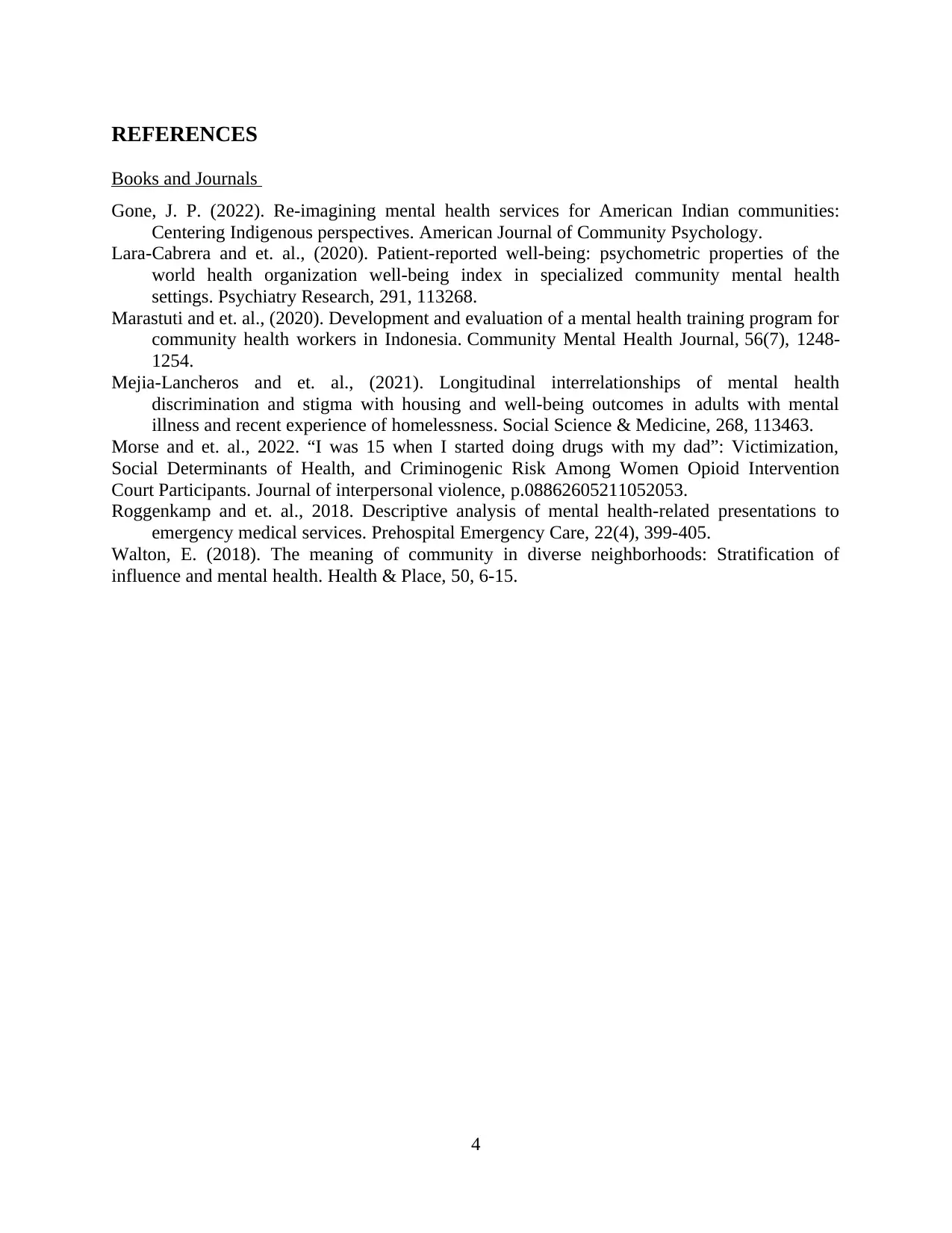
REFERENCES
Books and Journals
Gone, J. P. (2022). Re‐imagining mental health services for American Indian communities:
Centering Indigenous perspectives. American Journal of Community Psychology.
Lara-Cabrera and et. al., (2020). Patient-reported well-being: psychometric properties of the
world health organization well-being index in specialized community mental health
settings. Psychiatry Research, 291, 113268.
Marastuti and et. al., (2020). Development and evaluation of a mental health training program for
community health workers in Indonesia. Community Mental Health Journal, 56(7), 1248-
1254.
Mejia-Lancheros and et. al., (2021). Longitudinal interrelationships of mental health
discrimination and stigma with housing and well-being outcomes in adults with mental
illness and recent experience of homelessness. Social Science & Medicine, 268, 113463.
Morse and et. al., 2022. “I was 15 when I started doing drugs with my dad”: Victimization,
Social Determinants of Health, and Criminogenic Risk Among Women Opioid Intervention
Court Participants. Journal of interpersonal violence, p.08862605211052053.
Roggenkamp and et. al., 2018. Descriptive analysis of mental health-related presentations to
emergency medical services. Prehospital Emergency Care, 22(4), 399-405.
Walton, E. (2018). The meaning of community in diverse neighborhoods: Stratification of
influence and mental health. Health & Place, 50, 6-15.
4
Books and Journals
Gone, J. P. (2022). Re‐imagining mental health services for American Indian communities:
Centering Indigenous perspectives. American Journal of Community Psychology.
Lara-Cabrera and et. al., (2020). Patient-reported well-being: psychometric properties of the
world health organization well-being index in specialized community mental health
settings. Psychiatry Research, 291, 113268.
Marastuti and et. al., (2020). Development and evaluation of a mental health training program for
community health workers in Indonesia. Community Mental Health Journal, 56(7), 1248-
1254.
Mejia-Lancheros and et. al., (2021). Longitudinal interrelationships of mental health
discrimination and stigma with housing and well-being outcomes in adults with mental
illness and recent experience of homelessness. Social Science & Medicine, 268, 113463.
Morse and et. al., 2022. “I was 15 when I started doing drugs with my dad”: Victimization,
Social Determinants of Health, and Criminogenic Risk Among Women Opioid Intervention
Court Participants. Journal of interpersonal violence, p.08862605211052053.
Roggenkamp and et. al., 2018. Descriptive analysis of mental health-related presentations to
emergency medical services. Prehospital Emergency Care, 22(4), 399-405.
Walton, E. (2018). The meaning of community in diverse neighborhoods: Stratification of
influence and mental health. Health & Place, 50, 6-15.
4
⊘ This is a preview!⊘
Do you want full access?
Subscribe today to unlock all pages.

Trusted by 1+ million students worldwide

5
1 out of 7
Related Documents
Your All-in-One AI-Powered Toolkit for Academic Success.
+13062052269
info@desklib.com
Available 24*7 on WhatsApp / Email
![[object Object]](/_next/static/media/star-bottom.7253800d.svg)
Unlock your academic potential
Copyright © 2020–2026 A2Z Services. All Rights Reserved. Developed and managed by ZUCOL.





